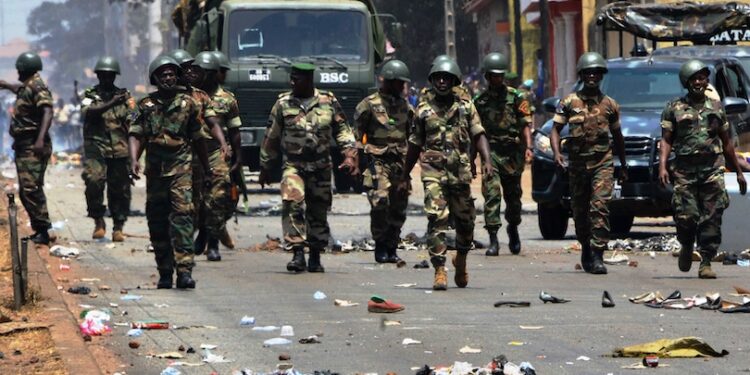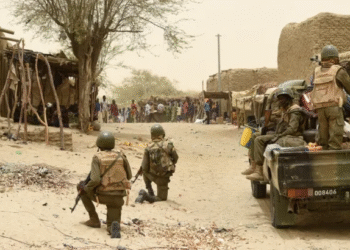Since August 2020, Africa has experienced eight coups. The last one was in Gabon. On August 30, just hours after the country’s election commission announced that President Ali Bongo Ondimba had been elected for a third term, a group of Gabonese military officers from the elite presidential guard unit seized power and placed the president under arrest at his palace. Later that day, the officers declared General Brice Oligui Nguema as chairman of the transition. The Gabon putsch was preceded by a military takeover in Niger on July 26, 2023, when the military announced the overthrow of President Mohamed Bazoum. General Abdourahamane Tiani became the new leader of the country.
After the Niger coup, the Economic Community of West African States (ECOWAS) threatened on August 10 to deploy a regional force to “restore constitutional order” in the francophone country. Before the toppling of Bazoum in Niger, there had been two toppling within a space of eight months in Burkina Faso — Ghana’s northern neighbour.The first ousting occurred on January 24, 2022, when President Roch Marc Christian Kaboré was removed from power by the military and Lieutenant-Colonel Paul-Henri Sandaogo Damiba was subsequently inaugurated president in February of the same year. On September 30, Lieutenant-Colonel Damiba, too, was at the receiving end of the bitter putsch pill when he was dismissed by the army and replaced by Captain Ibrahim Traoré as a transitional president until a presidential election scheduled for July 2024.
Before Burkina Faso, there was Sudan. On October 25, 2021, soldiers led by General Abdel Fattah al-Burhane chased out the transitional civilian leaders, who were supposed to lead the country towards democracy after 30 years of dictatorship of Omar al-Bashir, himself deposed in 2019. Since April 15, 2023, a power struggle war between General Burhane and his former deputy Mohamed Hamdane Daglo, has claimed, at least, 5,000 innocent lives. Ahead of the Sudan coup was that of Guinea. On September 5, 2021, the military overthrew President Alpha Condé and Colonel Mamady Doumbouya became president on October 1, 2021.
The military has promised to return the place to elected civilians by the end of 2024. Just like in the case of Burkina Faso, there were two coups in Mali, within nine months before Guinea’s. On August 18, 2020, President Ibrahim Boubacar Keïta was overthrown by the military, and a transitional government was formed in October. However, on May 24, 2021, the military arrested the President and the Prime Minister and Colonel Assimi Goïta was inaugurated in June as transitional president. The junta has committed to returning the place to civilians after the elections scheduled for February 2024.
Apart from Sudan, all the other seven other coups happened in Francophone West African countries. Right after the Gabon coup, Cameroon’s Paul Biya and Rwanda’a Paul Kagame announced major changes in the leadership of their countries’ armies. It is obvious they read the signs of the times and felt the coup storm heading their way. Born on 13 February 1933 as Paul Barthélemy Biya’a bi Mvondo, Paul Biya assumed the presidency on 6 November 1982, following his tenure as Prime Minister from 1975 to 1982. Biya is the second-longest-ruling president in Africa and currently serves as the world’s longest-consecutively serving non-royal national leader. He has spent 41 years in power and counting. At 80 years old, he is also the oldest head of state globally.
In Rwanda, another French-speaking country, President Kagame quickly retired hundreds of officers and soldiers and simultaneously promoted many young army men. He appointed new generals to lead army divisions situated across the country. Kagame, a former military officer, has served as the President of Rwanda since 2000. Before his presidency, he commanded the Rwandan Patriotic Front (RPF), a rebel force that played a key role in ending the Rwandan genocide. Kagame also held positions as Vice President and Minister of Defence from 1994 to 2000.
Why Are Coups Still Popular in Africa?
The two Pauls, Biya and Kagame, obviously made those army leadership changes cognisant of the fact that they may have overstayed their welcome. It is one of the curses of African democracy. Leaders do everything under the sun to entrench their grip on power, including removing constitutional term limits, incarcerating and sometimes killing their most prominent opponents, fuelling ethnic and tribal tensions, declaring a one-party state and, sometimes, becoming dynasties and keeping it all in their families.
For instance, after 56 years of enduring the Bongo dynasty, the Gabon military couldn’t take it anymore, thus, it’s ousting of Ali Bongo, who took over from his father Omar Bongo, who was the second president of the country for 42 good years. The same scenario is being played out in Togo, where Faure Gnassingbe took over the presidency from his late father Gnassingbe Eyadema, who governed the country for 38 years. And then there is Teodoro Obiang Nguema Mbasogo, who has been president of Equatorial Guinea for 44 years. At the age of 80, he run for a sixth term of seven years. Also, Denis Sassou Nguesso has been at the helm of the Republic of the Congo for 39 good years while Uganda’s 79-year-old Yoweri Museveni has led for 37 years. Such self-imposed longevity in office is anathema for many a people and an army.
Apart from the ‘Iddi Amin-Eyadema-Mugabe Syndrome’ – staying in office ‘forever’ until death – many African leaders have disappointed their people by dashing the trust they reposed in them to raise their standard of living, develop their country and make life bearable for the ordinary citizen. Sadly, most African leaders have proven to be corrupt. Amassing and looting state resources for themselves to the detriment of the millions of Africans who live in abject squalor. Seeing such unbridled looting and opulence by their leaders is enough of a trigger.
Also, ideological differences appear to trigger some of the coups. The desire, for example, by most Francophone West Africans for their leaders to break ties with France and stop being puppets of their former colonial masters, is a major concern that enrages their demons. The continued exploitation of former French colonies in Africa is irritating enough without their leaders being puppets around in a neo-colonialist manner. To them, Françafrique is modern colonialism which must end. This gives coup-makers a cause to rally the people around.
Like Kwame Nkrumah said: ‘Neo-colonialism is the last stage of imperialism’. The rebels with a cause, thus feel they have a duty to God and country, as patriotic citizens, to crush the imperialist before their countries are totally subsumed under the modern ‘French Empire’. Foreign interests in African countries are also coup igniters. When foreign powers do not like a certain African leader whose posturing is inimical to their economic or foreign policy interests, they conspire with the alternative government (opposition elements) to topple their ‘common enemy’. To them, it’s a win-win situation: the opposing side – be they tribal or political – gets to have its grip on power while the foreign interest gets to keep enjoying whatever economic, political or military interest it wants to be protected.
Tribalism and ethnocentrisms also have their roles in putsches. For a highly multilingual continent like Africa, where tribal sentiments hold sway, people identify with their tribes or ethnic groups first, for example, as either Tutsi or Hutu, before their Rwandan nationality. Tribalism has been a major source of political tension in the politics of many African countries. Once it transcends politics into the military, a great coup explosion happens beyond compare.
Security Implications for The Sub-Region
Coups disrupt progress, stifle development, disturb everything and nothing meaningful is achieved through such disruptions. The military regimes usually rule with an iron fist because all power is concentrated in the hands of the leaders without any checks and balances. The juntas gag freedom of speech, commit atrocities such as extra-judicial killings, trample the rights of civilians at will, do away with the Constitution, make arbitrary and unilateral decisions, and govern by dint of force rather than civilian buy-in. All these provide a fertile ground for insecurity. While some flee into exile, thus, exporting their skills and expertise elsewhere, others either stay behind to plot counter-coups or liaise with disgruntled internal or external armed groups such as militias to fight the regime.
Such situations, in turn, create a fertile ground for terrorist groups in the Sun region to fester. Unemployed youth get recruited into such groups while soldiers may violate girls and women at will. Also, regional blocs, international organisations and donor partners cut ties with coup nations to the detriment of development. The humanitarian price, thus, is hefty. Recently, the Economic Community of West African States (ECOWAS) said the military coups in Burkina Faso, Mali, and Niger were fuelling insecurity in the region. ECOWAS Commission President, Omar Touray, disclosed his welcome address at the 51st Ordinary Session of the ECOWAS Mediation and Security Council at the Ministerial Level in Abuja, on 6 December 2023.
To drive home the gravity of the insecurity created by coups from January 1 to October 23, 2023, the president said: “In just Burkina Faso, Mali, and Niger, a total of 4.8 million people face food insecurity, 2.4 million people are internally displaced, and close to 9,000 schools remain closed”. The threat by ECOWAS to use force to fight coup makers in the Sub-region as well as the severing of ties with coup countries by international organisations and Western powers, point to the fact that despite its many flaws, the world prefers democracy to kakistocratic juntas.
The recent coups are reminiscent of the 60s, 70s and 80s when putsches were the zeitgeist on the African continent. But after decades of practising the Western style of democracy, hasn’t Africa seen the benefits of effecting change through the ballot box rather than the nozzle or barrel of the gun? Or is the Western-style democracy at odds with African culture so much so that the two are irreconcilable? Is the African societal DNA too bound to fiefdom-like authority that it finds Western democracy alien and incompatible with its existence? Or must Africa evolve its unique style of democracy by borrowing a leaf from its revered chieftaincy customs and traditions?
Source: CISA Analyst































